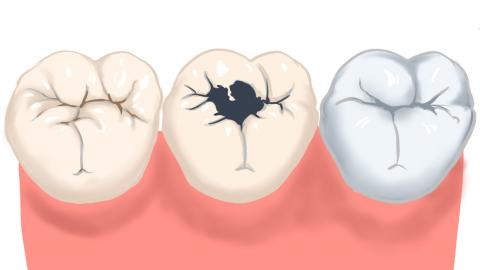What should I do if my three-year-old child has a toothache due to cavities?
Generally, toothache caused by cavities in a three-year-old child may result from excessive consumption of sweets, improper oral hygiene, mild caries, moderate caries, or deep caries with pulpitis in primary teeth. Depending on the specific situation, improvements can be achieved through general management, medication, or surgical treatment. Detailed analysis is as follows:
1. Excessive intake of sweets
When children frequently consume candies and sweet drinks, residual sugar in the mouth is broken down by bacteria into acids that erode primary teeth, leading to pain. Reduce sugary food intake, avoid giving sweets before bedtime, encourage the child to drink warm water after meals to clean the mouth, and use children's dental floss to help remove food particles between teeth.

2. Improper oral cleaning
Failure to establish regular toothbrushing habits leads to accumulation of food debris on the surface of primary teeth, forming dental plaque and causing cavity-related pain. Brush the child’s teeth twice daily (morning and night) using a soft-bristled toothbrush designed for children and fluoride-containing toothpaste, brushing for 2–3 minutes each time. Use an oral irrigator regularly to clean the mouth and maintain cleanliness of primary teeth.
3. Mild caries in primary teeth
Bacterial erosion of the enamel of primary teeth forms shallow cavities, which may irritate the dental pulp and cause mild pain. Under medical guidance, sodium fluoride glycerin paste, silver nitrate solution, or ammoniated silver nitrate solution can be applied to inhibit decay progression. Additionally, restorative filling using glass ionomer cement can be performed to fill the cavity.
4. Moderate caries in primary teeth
The decay extends into the superficial layer of dentin, causing noticeable pain upon exposure to hot or cold stimuli. First, remove the decayed tissue, place a glass ionomer cement base, then restore with filling material. If pain is significant, acetaminophen suspension drops or ibuprofen suspension may be used under medical supervision to relieve discomfort and prevent the child from refusing food due to pain.
5. Deep caries in primary teeth accompanied by pulpitis
The decay reaches the dental pulp, causing pulp infection and severe pain. Primary tooth root canal treatment is required—infected pulp tissue is removed, the root canal is disinfected and filled. If the primary tooth is severely loose and close to the natural exfoliation period, extraction may be considered after controlling the inflammation. After extraction, avoid chewing hard foods on the affected side.
In daily care, parents should help children develop good oral hygiene habits and schedule regular dental check-ups. Provide the child with lukewarm, soft, and easy-to-chew foods to minimize thermal stimulation. If the child's pain worsens or symptoms such as gum swelling or fever occur, seek prompt medical attention to prevent interference with eating and damage to primary tooth health, thereby laying a solid foundation for the proper eruption of permanent teeth.




